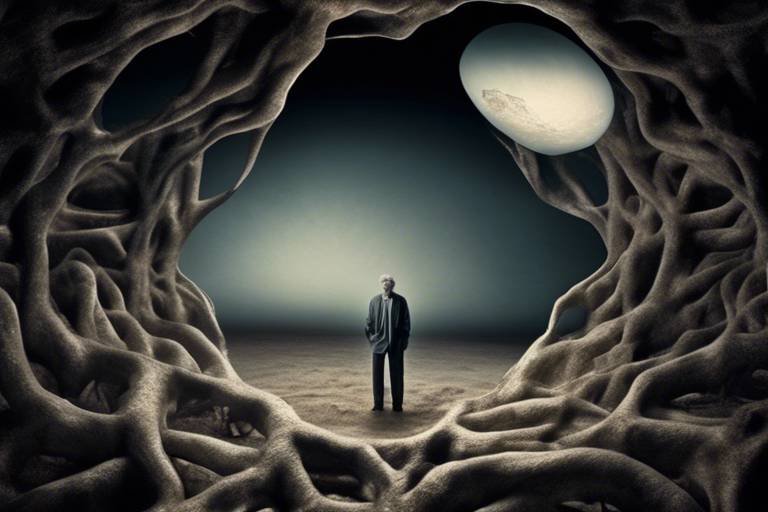Ontology - The Philosophy of Being
Ontology, at its core, is the study of being and existence. It asks the fundamental questions: What does it mean to exist? What is the nature of reality? This philosophical branch delves deep into the essence of things, exploring the fabric of our universe and our place within it. Think of ontology as a grand tapestry; each thread represents a different aspect of existence, interwoven to create a complex picture that reflects our understanding of the world.
The significance of ontology stretches far beyond the realm of philosophy. It influences various fields, including science, linguistics, and even artificial intelligence. In science, for instance, the ontological status of entities—whether they are real or merely theoretical—shapes our understanding of the natural world. In linguistics, the way we use language to describe existence can affect our perception of reality itself. Thus, ontology is not just an abstract concept; it is a vital framework that helps us navigate the complexities of existence.
As we embark on this exploration of ontology, it's essential to recognize that this philosophical inquiry is not merely academic. It invites us to reflect on our own lives and the world around us. Consider the implications of existence—what does it mean to be? Are we defined by our actions, our thoughts, or something deeper? These questions challenge us to think critically and engage with the world in a more profound way.
In the following sections, we will trace the historical development of ontology, examining the contributions of key thinkers who have shaped our understanding of being. From ancient philosophers to modern existentialists, each has left an indelible mark on the landscape of ontology. We will also explore key concepts such as existence, essence, and substance, which are crucial for grasping the nuances of this philosophical discipline.
Moreover, we will delve into contemporary debates surrounding ontology, considering how it continues to evolve in our understanding of reality. As we navigate through these discussions, we will also address the intricate relationship between ontology and language, as well as the implications of ontological questions in scientific inquiry. By the end of this article, we hope to provide a comprehensive understanding of ontology, illuminating its significance and relevance in our lives today.
- What is ontology?
Ontology is the branch of philosophy that studies the nature of being, existence, and reality.
- Why is ontology important?
Ontology helps us understand the fundamental nature of reality, influencing various fields such as science, linguistics, and artificial intelligence.
- How has ontology evolved over time?
Ontology has evolved from ancient philosophical inquiries to modern debates, with significant contributions from key thinkers throughout history.
- What are some key concepts in ontology?
Key concepts include existence, essence, substance, and identity, each contributing to our understanding of reality.

The Historical Development of Ontology
Ontology, the philosophical study of being and existence, has a rich and intricate history that spans from ancient times to the present day. Its roots can be traced back to the early Greek philosophers, who posed fundamental questions about what it means to exist. Thinkers like Parmenides and Heraclitus laid the groundwork by contrasting the notion of permanence with the idea of change, inviting us to ponder whether reality is static or dynamic.
As we move through history, we encounter the profound contributions of Aristotle, who is often hailed as the father of ontology. In his seminal work, the Metaphysics, Aristotle introduced the concept of substance, which he defined as that which exists in itself versus what exists in another. His distinction between potentiality and actuality provided a framework for understanding how entities come into being and persist over time. This duality of existence became a cornerstone of ontological thought.
The Middle Ages saw a fusion of Aristotelian ontology with religious thought, particularly in the works of Thomas Aquinas. He emphasized the relationship between existence and essence, arguing that God is the necessary being whose essence is to exist. This theological perspective added a layer of complexity to ontological discussions, as philosophers grappled with the implications of divine existence in relation to the material world.
Fast forward to the modern era, where the Enlightenment sparked new ways of thinking about existence. René Descartes, often regarded as the father of modern philosophy, famously declared, "I think, therefore I am." This assertion shifted the focus from external reality to the individual's consciousness, raising questions about the nature of existence itself. Descartes' dualism set the stage for existential inquiries that would dominate later philosophical discourse.
In the 19th and 20th centuries, ontology took on new dimensions with the advent of existentialism and phenomenology. Martin Heidegger, a pivotal figure in this transition, challenged traditional notions of being by emphasizing the importance of time and context. His work, Being and Time, explored the concept of "Dasein," or "being-there," which highlights the intertwined nature of existence and human experience. Heidegger's influence reshaped ontology, urging philosophers to consider how our understanding of being is rooted in lived experience.
Simultaneously, Jean-Paul Sartre pushed the boundaries of ontology through his existentialist lens. He famously posited that "existence precedes essence," suggesting that individuals create their own meaning in a world devoid of inherent purpose. This radical viewpoint not only redefined the relationship between existence and essence but also ignited debates about human freedom and responsibility, making ontology a vital part of existential thought.
Throughout history, the evolution of ontology reflects humanity's quest to understand the essence of existence. From ancient philosophical inquiries to modern existential debates, the discourse has continually evolved, shaping our understanding of reality and being. As we delve deeper into contemporary philosophy, we find that these historical perspectives remain influential, providing a rich tapestry of ideas that continue to challenge and inspire thinkers today.
- What is ontology? Ontology is the philosophical study of being, existence, and the nature of reality.
- Who were the key figures in the development of ontology? Key figures include Parmenides, Aristotle, Thomas Aquinas, René Descartes, Martin Heidegger, and Jean-Paul Sartre.
- How has ontology influenced modern philosophy? Ontology has shaped discussions around existence, essence, and identity, influencing fields such as existentialism, phenomenology, and even science.

Key Concepts in Ontology
Ontology is a rich and intricate field of philosophy that explores the very fabric of reality and existence. At its core, ontology seeks to answer fundamental questions about what it means to be. This exploration is not just an abstract exercise; it has profound implications for how we understand the world around us. To grasp ontology fully, we must delve into several key concepts that form its foundation. These include existence, essence, and substance, each playing a crucial role in shaping our perception of reality.
First, let's talk about existence. This concept refers to the state of being real or having an actual presence in the world. It's one thing to say something exists, and quite another to understand what that existence entails. For instance, when we claim that a tree exists, we are asserting its physical presence. However, existence also raises questions about non-existence and the nature of things that do not have a physical form, such as ideas or emotions. These complexities show that existence is not just a binary state; it's a spectrum filled with nuances.
Next, we have essence, which is often seen as the intrinsic nature or indispensable quality of something that determines its character. Think of essence as the blueprint that defines what something is. For example, the essence of a chair includes its function as a seat and its structure that supports that function. In philosophical terms, essence goes beyond mere physical attributes; it encompasses the qualities that make a thing uniquely what it is. This distinction leads us to ponder questions like: Does essence precede existence, or is it the other way around?
To illustrate how these concepts interact, consider the famous philosophical debate between existence and essence, particularly in the works of Sartre and Heidegger. Sartre famously posited that for humans, existence precedes essence, meaning that we first exist and then define ourselves through our actions and choices. On the other hand, Heidegger emphasized a more intertwined relationship, suggesting that understanding our essence is essential to grasping our existence. This philosophical tug-of-war highlights how these concepts shape not just academic discourse but also our everyday lives.
Finally, we must address the concept of substance, which refers to what something is fundamentally. Substance can be thought of as the underlying reality that supports all properties and changes. For example, when we think about a tree, the substance might be the matter that composes it, but it also includes its potential for growth and change over time. This leads us to consider questions about identity: What makes a tree the same tree throughout its life, despite its changing leaves and bark? Understanding substance helps us navigate these questions of identity and continuity.
In summary, the key concepts of existence, essence, and substance are vital to ontology. They not only help us dissect the nature of reality but also challenge us to reflect on our own existence and identity. These ideas are not static; they evolve as we engage with them, prompting us to ask deeper questions about our place in the universe and the nature of the things around us.
- What is ontology? Ontology is a branch of philosophy that studies the nature of being, existence, and reality.
- How does ontology differ from other philosophical disciplines? Unlike other branches, ontology focuses specifically on questions related to existence and the categories of being.
- Why is understanding ontology important? Understanding ontology helps us frame our questions about existence and informs our perspectives in various fields, including science and ethics.

Existence vs. Essence
When we dive into the philosophical waters of existence and essence, we're embarking on a journey that has puzzled thinkers for centuries. At its core, this distinction can be likened to the difference between a blueprint and the actual building. While the blueprint (essence) outlines the design and purpose, the building (existence) is what we see and interact with in the real world. This analogy sets the stage for understanding just how profound and impactful these concepts are on our perception of reality.
The debate over existence and essence gained significant traction with existentialists like Jean-Paul Sartre and Martin Heidegger. Sartre famously declared that "existence precedes essence," suggesting that individuals are not born with a predefined purpose or nature. Instead, they create their own essence through their actions and choices. This radical idea flips the traditional notion on its head. Imagine a blank canvas; it's only through the strokes of the artist's brush that the painting comes to life. In this sense, human beings are the artists of their own lives, crafting meaning and identity through their experiences.
On the other hand, Heidegger approached the relationship between existence and essence from a different angle. He emphasized the importance of being itself, rather than the essence that defines it. For Heidegger, understanding existence is not merely about what something is, but about the very act of being. He believed that we must confront our existence directly, engaging with the world around us in a way that reveals the truth of our being. This perspective invites a deeper inquiry into our own lives, urging us to ask questions like: What does it mean to be? How do we experience our existence?
To illustrate these concepts further, consider the following table that summarizes the key differences between existence and essence:
| Aspect | Existence | Essence |
|---|---|---|
| Definition | The state of being, the fact that something is present. | The inherent nature or fundamental characteristics of something. |
| Philosophical View | Existence is primary; individuals define their essence through actions. | Essence is primary; predefined characteristics dictate existence. |
| Key Thinkers | Jean-Paul Sartre, Martin Heidegger | Aristotle, Plato |
As we navigate through the intricacies of existence and essence, it's essential to recognize how these ideas influence not only philosophy but also our daily lives. They challenge us to reflect on our choices and the meanings we create. Are we merely existing, or are we actively shaping our essence? This question lingers, prompting us to engage with our world in a more meaningful way.
In conclusion, the exploration of existence versus essence opens a Pandora's box of questions and insights. It invites us to reconsider our understanding of what it means to be human and to reflect on the profound implications of our existence. In a world that often feels chaotic and uncertain, grasping these concepts can offer clarity and direction, guiding us toward a more intentional and fulfilling life.
- What is the main difference between existence and essence?
Existence refers to the state of being present, while essence pertains to the inherent qualities that define something. - Who are the key philosophers associated with these concepts?
Jean-Paul Sartre and Martin Heidegger are notable figures who explored the relationship between existence and essence. - How do these concepts apply to everyday life?
Understanding existence and essence can encourage individuals to reflect on their choices and the meanings they create in their lives.

Heidegger's Influence
Martin Heidegger, a towering figure in 20th-century philosophy, profoundly reshaped our understanding of ontology. His seminal work, Being and Time, published in 1927, is often regarded as a cornerstone of existential philosophy. Heidegger's approach to being is unique; he posits that the question of being itself has been overlooked in the history of Western philosophy. Instead of merely defining what it means to exist, he urges us to consider our own existence and how it relates to the world around us.
At the heart of Heidegger's philosophy is the concept of ‘Dasein’, a German term that translates to 'being-there.' This term encapsulates the idea that humans are not just isolated entities but are fundamentally intertwined with their environments and contexts. For Heidegger, understanding being requires an examination of Dasein, as it is through our experiences that we come to grasp the essence of existence. He famously stated, “We are ourselves the entities to be analyzed,” emphasizing that our own being is the starting point for any ontological inquiry.
Heidegger also introduces the notion of ‘thrownness’ (Geworfenheit), which refers to the idea that individuals are 'thrown' into a world they did not choose, filled with pre-existing meanings and contexts. This concept challenges the traditional notion of a free, autonomous self and instead presents a more complex picture of human existence. We are shaped by our historical and cultural contexts, which influence our understanding of reality. This perspective invites us to reflect deeply on our own lives and the circumstances that define our existence.
Moreover, Heidegger's exploration of ‘being-toward-death’ highlights the significance of mortality in shaping our understanding of existence. He argues that confronting our own finitude can lead to a more authentic way of being. By recognizing that our time is limited, we are encouraged to live more fully and meaningfully, making choices that reflect our true selves rather than conforming to societal expectations.
Heidegger's influence extends beyond philosophy into various fields, including literature, psychology, and even art. His ideas have inspired countless thinkers and movements, prompting a reevaluation of how we perceive existence. For instance, existentialism, which focuses on individual freedom and choice, draws heavily from Heidegger's insights about being and authenticity. In contemporary discussions, his thoughts on technology and its impact on our relationship with being continue to resonate, as we navigate an increasingly digital world.
In summary, Martin Heidegger's contributions to ontology are not just academic; they challenge us to reflect on our existence and the world we inhabit. His emphasis on Dasein, thrownness, and being-toward-death encourages a deeper understanding of what it means to be alive. As we grapple with these ideas, we find ourselves better equipped to navigate the complexities of our own lives and the reality that surrounds us.
- What is the main focus of Heidegger's philosophy?
Heidegger's philosophy primarily focuses on the question of being and how it relates to human existence, emphasizing the importance of Dasein. - How does Heidegger define 'Dasein'?
Dasein refers to the experience of being that is unique to humans, highlighting our interconnectedness with the world and our historical context. - What is the significance of 'thrownness' in Heidegger's thought?
Thrownness illustrates how individuals are placed in a world they did not choose, shaping their understanding and experiences of existence. - How has Heidegger influenced modern philosophy?
Heidegger's work has inspired various philosophical movements, particularly existentialism, and continues to impact discussions on technology, art, and psychology.

Sartre's Existentialism
Jean-Paul Sartre, a towering figure in 20th-century philosophy, revolutionized our understanding of existence through his existentialist lens. At the heart of Sartre's philosophy is the provocative assertion that existence precedes essence. This means that individuals are not born with a predetermined purpose or nature; rather, they must forge their own identity and values through their choices and actions. Imagine being handed a blank canvas instead of a pre-painted picture; it’s up to you to create your own masterpiece. This idea challenges the traditional notion that there is a fixed essence that defines human beings and instead emphasizes the importance of personal freedom and responsibility.
Sartre's existentialism posits that humans are condemned to be free. This notion can be both exhilarating and terrifying. On one hand, it liberates us from the constraints of societal norms and expectations, allowing us to define our own paths. On the other hand, it places the heavy burden of responsibility squarely on our shoulders. There is no external authority to dictate our choices; we must navigate the complexities of life on our own. This freedom can lead to feelings of anguish and absurdity, as individuals grapple with the weight of their decisions in a seemingly indifferent universe.
In his seminal work, Being and Nothingness, Sartre explores the concepts of being-for-itself and being-in-itself. Being-for-itself refers to conscious beings, like humans, who possess self-awareness and the ability to reflect on their existence. In contrast, being-in-itself pertains to non-conscious entities, such as objects, which simply exist without awareness or purpose. This distinction underscores the complexity of human existence and the unique challenges we face as conscious beings. Sartre argues that our consciousness is characterized by a constant striving for meaning, which often leads to existential crises when confronted with the absurdity of life.
Moreover, Sartre's existentialism emphasizes the significance of authenticity. To live authentically means embracing our freedom and making choices that reflect our true selves, rather than conforming to societal expectations. This pursuit of authenticity requires courage, as it often involves confronting uncomfortable truths about ourselves and the world around us. Sartre famously stated, "Man is nothing else but what he makes of himself," encapsulating the idea that we are the architects of our own lives.
Ultimately, Sartre's existentialism invites us to engage deeply with our existence and to recognize the profound implications of our freedom. It challenges us to reflect on the choices we make and the values we uphold, urging us to live intentionally and authentically. In a world that often feels chaotic and uncertain, Sartre's philosophy serves as a reminder that we have the power to shape our own destinies.
- What does "existence precedes essence" mean? This phrase means that individuals are not born with a predetermined purpose; they create their own identity through choices.
- How does Sartre define authenticity? Authenticity involves living in accordance with one's true self and values rather than conforming to societal expectations.
- What is the significance of freedom in Sartre's philosophy? Freedom is central to Sartre's existentialism, as it emphasizes personal responsibility and the need to make meaningful choices.
- How does Sartre's view differ from traditional philosophy? Traditional philosophy often posits that essence defines existence, while Sartre argues that existence comes first and essence is created through actions.

Substance and Identity
When we dive into the depths of ontology, one of the most intriguing concepts we encounter is the relationship between substance and identity. At its core, substance refers to what something is fundamentally made of, while identity pertains to what makes that thing uniquely itself over time. Imagine a classic wooden chair. What makes it a chair? Is it the wood, the design, or perhaps the function it serves? These questions lead us into a rich tapestry of philosophical inquiry.
Throughout history, philosophers have grappled with these questions, attempting to discern how substances contribute to identity. For instance, Aristotle posited that substances are individual entities that possess both matter and form, suggesting that a chair's identity is tied not only to its physical properties but also to its purpose and design. In contrast, modern thinkers like David Lewis have introduced the idea of modal realism, which posits that all possible worlds are as real as the actual world. This perspective complicates our understanding of identity by suggesting that what we consider 'real' is just one of many potential existences.
To further illustrate the relationship between substance and identity, consider the following table:
| Philosopher | Concept of Substance | View on Identity |
|---|---|---|
| Aristotle | Substance as a combination of matter and form | Identity is tied to function and essence |
| David Lewis | Modal realism - substances exist in all possible worlds | Identity can vary across different worlds |
| John Locke | Substance as the underlying reality behind observable properties | Identity is based on continuity of consciousness |
This table illustrates how different philosophers approach the intricate dance between substance and identity. For instance, while Aristotle emphasizes the essence of an object, Locke shifts the focus to the continuity of consciousness, suggesting that identity is not merely about physical properties but also about the experiences and memories that define us.
Moreover, the concept of identity raises compelling questions about change. If a substance undergoes transformation—like a wooden chair being painted or reupholstered—does it remain the same chair? This question is reminiscent of the famous Ship of Theseus paradox, which asks whether a ship that has had all its components replaced remains the same ship. The philosophical implications are profound, challenging our understanding of what it means to be 'the same' over time.
In contemporary discussions, the relationship between substance and identity continues to evolve, especially with advancements in fields such as neuroscience and artificial intelligence. As we explore the nature of consciousness and identity in machines, we find ourselves revisiting age-old ontological questions. Can a robot with a sophisticated AI truly possess an identity? If it learns and adapts, does it develop a substance of its own?
In conclusion, the exploration of substance and identity is not merely an academic exercise. It resonates with our everyday experiences and challenges us to consider the very essence of what it means to exist. As we navigate through life, the questions surrounding our identity—what defines us, what changes us, and what remains constant—are as relevant today as they have ever been.
- What is the difference between substance and essence? Substance refers to the physical or fundamental nature of an object, while essence pertains to its inherent qualities or characteristics that define what it is.
- How do philosophers view identity over time? Philosophers have various perspectives on identity over time, with some suggesting that identity is tied to physical continuity, while others argue it is based on psychological continuity or memory.
- What role does language play in understanding substance and identity? Language shapes our perceptions and classifications of substances and identities, influencing how we communicate and understand these concepts.
- Can identity exist without substance? This is a complex question; some argue that identity is inherently tied to substance, while others believe that abstract concepts can exist independently of physical forms.

Ontology in Contemporary Philosophy
In the realm of contemporary philosophy, ontology has blossomed into a vibrant field of inquiry, engaging thinkers from various disciplines and challenging traditional notions of existence. Today, ontological questions are not just confined to the dusty halls of philosophy departments; they resonate across fields like linguistics, psychology, and even quantum physics. As we grapple with the complexities of modern life, the fundamental questions of what it means to exist and what constitutes reality have become more pressing than ever.
One of the key features of contemporary ontology is its interdisciplinary nature. Philosophers are increasingly drawing upon insights from other fields to inform their understanding of being. For instance, the rise of analytic philosophy has led to rigorous discussions about the nature of objects and their properties, while continental philosophy often delves into the existential implications of being. This blend of approaches has enriched the discourse, allowing for a more nuanced exploration of ontological themes.
Moreover, the advent of postmodernism has significantly influenced ontological debates. Thinkers like Jacques Derrida and Michel Foucault have challenged the notion of a stable, objective reality, suggesting instead that our understanding of existence is mediated by language, culture, and power structures. This perspective raises intriguing questions: Is our perception of reality merely a construct? How do societal influences shape our understanding of what it means to be?
In addition to linguistic and cultural considerations, contemporary ontology also engages with the implications of science. The rise of quantum mechanics has forced philosophers to reconsider traditional ontological categories. For example, the concept of superposition in quantum physics, where particles can exist in multiple states simultaneously, challenges the classical notion of identity and existence. This has led to a fascinating dialogue between scientists and philosophers, as they seek to understand the implications of these scientific discoveries on our conception of reality.
As we navigate these complex discussions, several key themes have emerged in contemporary ontological debates:
- The Nature of Objects: What constitutes an object? Is it merely a collection of properties, or does it have an independent existence?
- Identity and Change: How do we understand the persistence of identity over time? What happens to an object as it undergoes change?
- Reality and Perception: How does our perception shape our understanding of reality? Are there objective truths, or is everything subjective?
These themes not only reflect the richness of contemporary ontology but also highlight its relevance in addressing the challenges of modern existence. As we continue to explore these questions, it becomes clear that ontology is not merely an abstract philosophical pursuit; it is a vital lens through which we can examine our lives, our choices, and our place in the universe.
Q1: What is ontology in simple terms?
Ontology is the branch of philosophy that studies the nature of being, existence, and reality. It seeks to answer questions about what entities exist and how they can be categorized.
Q2: How does contemporary ontology differ from traditional ontology?
Contemporary ontology often incorporates insights from various disciplines, such as science and linguistics, and engages with postmodern critiques of objective reality, unlike traditional ontology, which focused more on metaphysical questions.
Q3: Why is ontology important in today's world?
Ontology helps us understand the complexities of existence and reality, which are increasingly relevant in a world shaped by rapid technological advancements and shifting cultural paradigms.

Ontology and Language
When we dive into the fascinating world of ontology, we can't ignore the intricate relationship it shares with language. Language is not just a tool for communication; it shapes our very understanding of reality. Think about it: how we articulate our thoughts and experiences is deeply intertwined with how we perceive existence itself. If ontology is the study of being, then language acts as the lens through which we interpret that being. It’s almost like trying to catch a glimpse of a beautiful landscape through a foggy window—our words can either clarify or obscure that view.
One of the primary ways language influences ontology is through its ability to categorize and define concepts. For instance, consider the distinction between concrete and abstract nouns. Concrete nouns refer to tangible objects, like a "tree" or a "car," while abstract nouns encompass ideas or qualities, such as "freedom" or "justice." This categorization helps us navigate the complex landscape of existence. Without language, how would we even begin to express the nuances of our experiences? We would be left with a chaotic jumble of thoughts, struggling to find meaning.
Moreover, different languages can offer unique ontological perspectives. For example, the way time is expressed in various languages can influence how speakers perceive its passage. In English, we often think of time as a linear progression—past, present, and future. However, in some Indigenous languages, time is viewed more cyclically, which can lead to a fundamentally different understanding of existence and our place within it. This raises intriguing questions: Does the language we speak shape our reality? Or does our reality shape the language we use? The interplay between ontology and language is a dynamic dance, constantly evolving and reshaping our understanding of the world.
Furthermore, philosophers like Wittgenstein have famously posited that the limits of our language are the limits of our world. This suggests that our ontological inquiries are inherently bound by the linguistic frameworks we utilize. If we lack the vocabulary to articulate certain experiences or concepts, do they cease to exist in our understanding? This notion challenges us to expand our linguistic horizons, pushing the boundaries of what we can conceive and comprehend.
In contemporary discussions, the relationship between ontology and language has also been explored through the lens of semiotics, the study of signs and symbols. This field examines how meaning is constructed and conveyed through various forms of communication, including language. The semiotic perspective emphasizes that words are not merely labels for objects; they carry connotations and cultural significance that shape our perception of reality. For example, the word "home" evokes feelings of safety and belonging, while "house" might merely refer to a physical structure. This distinction highlights how language can imbue our understanding of existence with emotional and cultural layers.
Ultimately, the relationship between ontology and language is a rich field of inquiry that invites us to reflect on our own experiences and perceptions. It challenges us to consider how our words shape our understanding of being and existence. As we continue to explore these profound questions, we may find that the way we articulate our thoughts can lead to a deeper appreciation of the intricate tapestry of reality that surrounds us.
- What is ontology?
Ontology is the philosophical study of being, existence, and the nature of reality. - How does language influence our understanding of reality?
Language shapes our perceptions and categorizes our experiences, impacting how we interpret existence. - Can different languages lead to different ontological perspectives?
Yes, the structure and vocabulary of a language can influence how its speakers perceive concepts like time and existence. - What role do philosophers play in the study of ontology and language?
Philosophers examine the relationship between language and existence, exploring how our words can shape or limit our understanding of reality.

Ontology in Science
When we think about science, we often picture experiments, data, and tangible results. But beneath this surface lies a rich tapestry of ontological questions that challenge our understanding of reality itself. What does it mean for something to exist? How do we categorize and define the entities we study? These questions aren't just philosophical musings; they have real implications for how we conduct research and interpret findings.
In the realm of science, ontology serves as a foundational pillar. It helps scientists clarify what kinds of things exist in the universe and how these entities relate to one another. For instance, consider the distinction between physical objects and abstract concepts. A tree exists in the physical world, while the idea of "tree-ness" is an abstract concept. Understanding this distinction is crucial for fields like biology and ecology, where the classification of living organisms depends on our ontological framework.
Moreover, different scientific paradigms approach ontological questions in unique ways. In physics, for example, the debate between realism and anti-realism reflects differing ontological commitments. Realists argue that the entities described by scientific theories, like electrons or black holes, exist independently of our observations. In contrast, anti-realists contend that these entities are merely useful fictions that help us make sense of our experiences. This ongoing debate highlights how ontological assumptions shape the very fabric of scientific inquiry.
To further illustrate the impact of ontology in science, consider the following table that outlines how different scientific disciplines approach ontological questions:
| Discipline | Ontological Focus | Key Questions |
|---|---|---|
| Physics | Nature of matter and energy | What is the fundamental nature of reality? |
| Biology | Classification of living organisms | What constitutes a living being? |
| Psychology | Mental states and consciousness | What is the nature of the mind? |
| Computer Science | Data and information structures | What is the essence of information? |
As we delve deeper into scientific exploration, the significance of ontology becomes even more pronounced. For instance, in the field of quantum mechanics, the nature of particles and their behaviors raises profound ontological questions. Are particles real entities, or are they simply mathematical abstractions? The implications of these questions ripple through the scientific community, influencing everything from theoretical frameworks to experimental methodologies.
Furthermore, in the age of big data and artificial intelligence, ontology plays a crucial role in how we structure and interpret vast amounts of information. As we seek to create more sophisticated algorithms and models, understanding the underlying ontological assumptions can lead to more robust and meaningful insights. For example, in machine learning, the way we define categories and relationships among data points can significantly impact the outcomes of our analyses.
In conclusion, ontology in science is not merely an abstract concern; it is a vital aspect that shapes our understanding of the universe. By grappling with ontological questions, scientists can better articulate their theories, refine their methodologies, and ultimately enhance our collective knowledge about the world around us. So, the next time you read a scientific paper or engage in a discussion about scientific findings, take a moment to reflect on the ontological dimensions at play. It might just change the way you perceive reality.
- What is ontology? Ontology is the branch of philosophy that studies the nature of being, existence, and reality.
- How does ontology relate to science? Ontology provides the foundational questions and frameworks that shape scientific inquiry and understanding of reality.
- Why is ontology important in scientific research? It helps clarify what entities exist and how they relate to each other, influencing research methodologies and interpretations.
- Can ontology impact the results of scientific studies? Yes, different ontological assumptions can lead to varying interpretations and conclusions in scientific research.
Frequently Asked Questions
- What is ontology?
Ontology is a branch of philosophy that studies the nature of being, existence, and reality. It seeks to understand what entities exist and how they can be categorized and related within a hierarchy. Think of it as the foundation of understanding everything that is, from objects to concepts!
- How has ontology developed over time?
Ontology has evolved significantly from ancient philosophy, where thinkers like Aristotle laid the groundwork, to modern philosophers like Heidegger and Sartre, who introduced new perspectives. This evolution reflects changing ideas about existence and the essence of being, shaping our current understanding of reality.
- What is the difference between existence and essence?
Existence refers to the state of being real or having an actual presence, while essence pertains to the fundamental nature or intrinsic characteristics of an entity. Philosophers like Sartre argued that existence precedes essence, meaning individuals create their own essence through actions, rather than being defined by predetermined qualities.
- How does Heidegger influence ontology?
Martin Heidegger had a profound impact on ontology by emphasizing the concept of "Being" and how humans relate to it. His work encourages us to explore not just what exists but the nature of existence itself, challenging us to consider our place in the world and the meaning of our being.
- What is Sartre's existentialism?
Sartre's existentialism posits that individuals are free and responsible for creating their own meaning in life. He famously stated that "existence precedes essence," suggesting that we first exist and then define ourselves through our choices and actions, which can be both liberating and daunting.
- Why is substance important in ontology?
Substance is crucial in ontology because it relates to the identity and persistence of objects over time. Understanding what constitutes a substance helps us grasp how entities maintain their identity despite changes, which is essential for discussions on reality and existence.
- How is ontology relevant in contemporary philosophy?
In contemporary philosophy, ontology remains a vital area of inquiry, influencing debates on metaphysics, language, and science. Philosophers continue to explore ontological questions, examining how our understanding of being affects various fields and our interpretation of reality.
- What is the relationship between ontology and language?
Ontology and language are intertwined; the way we use language shapes our understanding of being. Linguistic structures influence how we categorize and interpret the world, highlighting the importance of language in forming our conceptual frameworks about existence.
- How does ontology apply to science?
Ontology plays a significant role in scientific inquiry by addressing fundamental questions about what entities exist in the universe. Different scientific paradigms approach these ontological questions in varying ways, impacting how we understand reality and the nature of existence in the scientific realm.



















